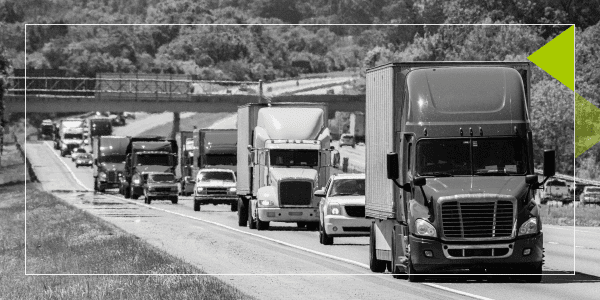
Bottlenecks not only slow down your supply chain, but they also lead to costly delays, increased operational expenses, and can severely impact customer satisfaction. Whether they are caused by inefficiencies in warehousing, or challenging transportation routes, the disruption in the flow of your goods has substantial negative effects.
How Bottlenecks Impact a Business
When a specific part of your supply chain becomes overwhelmed, a bottleneck forms that delays the overall flow of your products. The most common causes include congested ports, limited warehouse capacity, inefficient transportation management , and outdated technology. While these may seem like isolated issues, they can have ripple effects throughout your supply chain, creating widespread interruptions. Bottlenecks can lead to:
1. Increased Lead Times
This can have a significant impact on customer satisfaction, especially in industries where timely delivery is important. A delay may cascade down the entire supply chain, pushing back delivery times and missing crucial deadlines.
2. Rising Operational Costs
Bottlenecks can also drive-up operational costs as companies rush to resolve issues such as overcrowded or understaffed warehouses, missed appointments, and rerouted shipments. These challenges often lead to additional expenses, including increased storage fees, expedited shipping, and overtime labor to recover from delays.
3. Inventory Management Challenges
Supply chain congestion can lead to poor inventory management. When shipments are delayed, stock might pile up, making it difficult to keep accurate inventory levels. This increases the likelihood of stockouts or overstocking, both of which can harm a company’s bottom line. Additionally, perishable or time-sensitive products may spoil or lose value due to prolonged delays.
4. Missed Opportunities
Bottlenecks can make businesses less agile and responsive to market demands. Businesses may miss out on sales opportunities or fail to meet customer expectations due to supply chain issues. This can harm a company’s reputation and make it difficult to compete in fast-moving markets.
With all these negative impacts, how can you prevent bottlenecks in your supply chain?
How to Avoid Bottlenecks
Given the serious impact that bottlenecks can have on any business, shippers and manufactures must take proactive steps to minimize the likelihood of congestion in their supply chain. Bottlenecks can generally be prevented with:
1. Collaborative Supply Chain Planning
Work closely with suppliers, manufacturers, and distributors to ensure that everyone is aligned on your shipment schedules. Effective communication and collaboration allow for better visibility into potential bottlenecks before they happen.
Implementing integrated supply chain management systems can improve data sharing and help identify potential bottlenecks early on. When all parts of the supply chain have access to accurate, real-time data, they can work together to solve issues proactively rather than reactively.
2. Investing in Automation and Technology
Outdated manual processes are a common cause of warehouse bottlenecks. You can avoid disruptions by integrating with technology that automates warehouse management, transportation scheduling, and order processing. Warehouse automation tools can speed up the flow of goods and reduce the risk of errors that contribute to bottlenecks.
3. Diversifying Transportation Options
Relying on a single carrier can increase the likelihood of bottlenecks, especially when unexpected disruptions occur. Diversifying transportation options—can help businesses remain flexible and avoid delays.
When one carrier becomes congested, companies can adjust their shipments to alternative providers to avoid bottlenecks.
Avoid Bottlenecks with a Trusted Freight Partner
Third-party logistics providers (3PLs) bring expertise, resources, and a network of partners that help businesses streamline their operations. When you work with a 3PL like King Solutions, you get:
1. Access to a Broader Carrier Network
Take advantage of established relationships with multiple carriers, allowing for greater flexibility in transportation modes and routes. This can help avoid bottlenecks by diversifying options for moving freight.
2. Scalability and Flexibility
As an asset-based 3PL, we help businesses scale their logistics operations during peak seasons or periods of high demand. This scalability allows businesses to avoid bottlenecks by ensuring that they have the necessary resources and capacity to handle increased shipments. Whether it’s increasing storage space, adjusting transportation routes, or optimizing warehouse operations, we can provide the flexibility you need to avoid congestion and make your deliveries on time.
3. Problem Solving and Quick Response
When bottlenecks cannot be avoided, you can trust in our experience to identify the root causes of congestion and implement strategies to mitigate it. We ensure that businesses can recover quickly from disruptions and avoid long-term delays. Our dedicated team keeps an eye on your operations, helping you maintain the visibility you need to react quickly and pivot when you need to.
Avoid the Impact of Bottlenecks
A well-planned and flexible logistics strategy helps prevent bottlenecks and improves overall the performance of your business. But don’t do it alone. Work with our team to fortify your supply chain and mitigate any risks. We have the expertise, resources, and technology needed to help you stay competitive in your industry. Get in touch with us today to talk about the solutions your business needs.







 Joel Rice
Joel Rice